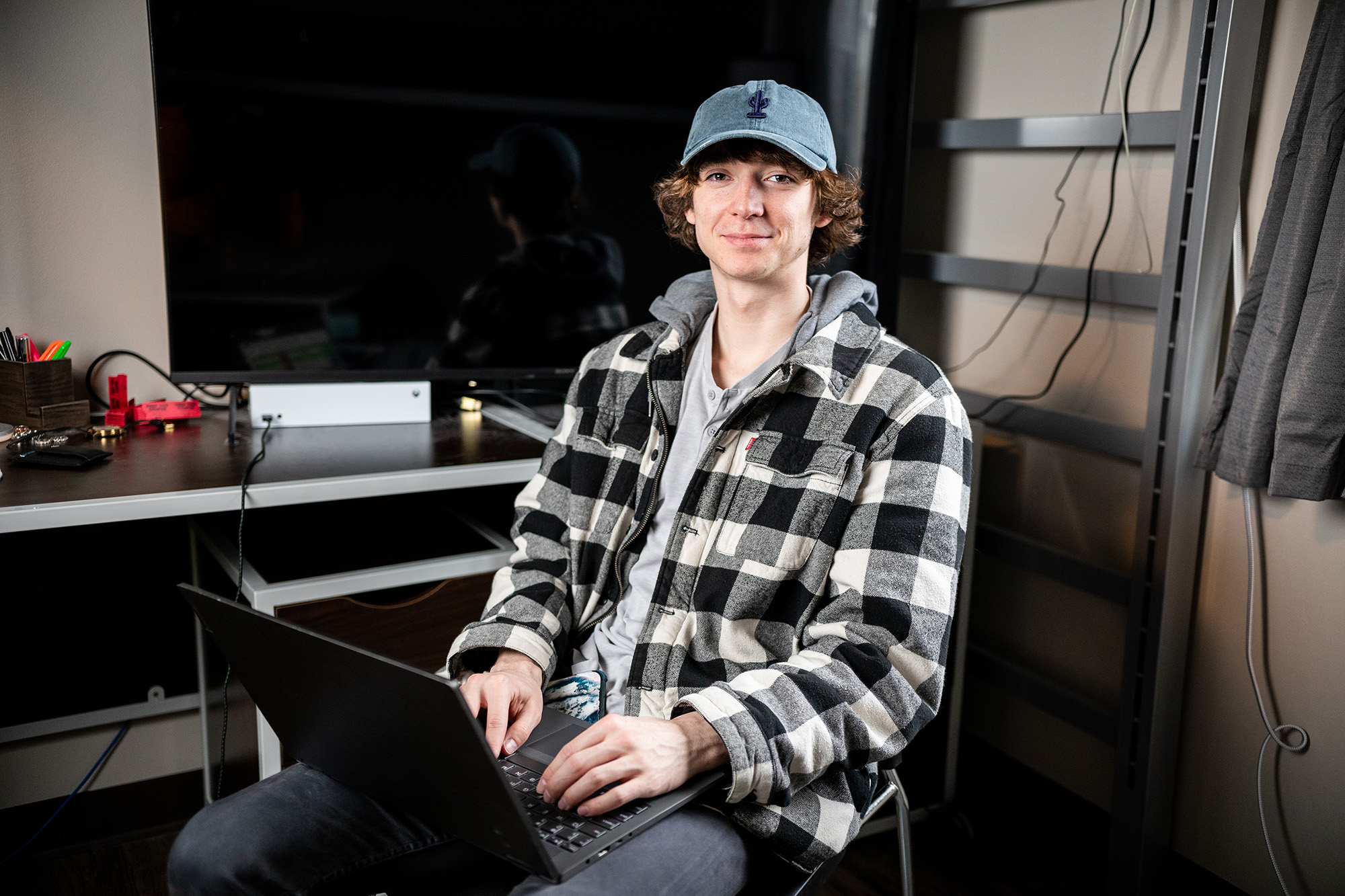Lakeland freshman advances in business plan contest
When you consider Lakeland University freshman Ashton Wallace’s pedigree, becoming an entrepreneur seems pretty obvious.
Beginning with his great-grandfather down to his parents, Wallace’s family is dotted with successful startups and business ownership.
Wallace, a 19-year-old business administration major at Lakeland from Richland Center, Wis., is one of 49 entries to advance to the semifinal round of the 20th annual Wisconsin Governor’s Business Plan Contest, which links up-and-coming entrepreneurs with a statewide network of community resources, expert judges, mentors and possible sources of capital.
“In the start-up and entrepreneurial world, this competition is a big deal,” said Stephanie Hoskins, Lakeland’s Herbert Kohler & Frank Jacobson Chair of Business and Entrepreneurship.
“It’s a badge of honor to make it past that first round because that’s probably the hardest to get through. For a lot of startups, it takes multiple tries to make it through the first round. For Ashton to make it past the first round with an idea he started working on three months ago is pretty incredible.”
Wallace’s work is an example of the growing number of entrepreneurial opportunities available to Lakeland students through existing courses, Jake’s, A Lakeland Community and Launch: Lakeland Student-Run Businesses.
Wallace’s idea is an app called BozWal, which generates trip itineraries based on location, financial, bucket list and other preferences inputted by users.
For example, a college student exploring spring break options inputs ideas of where they want to visit and their budget. BozWal produces a complete adventure including suggestions for hotels, restaurants, sites to see, car rentals, etc. Businesses can move up in the app’s algorithm for a fee, and Wallace would get a commission for every booking made because of his app.
The app is named for Wallace and his best friend from home and business partner, Sam Bosworth.
“I don’t expect this to go on to be a million-dollar business,” Wallace said. “But having startup experience and pitch competition experience on my resume is huge. I’m learning a lot. I have a whole bunch of other ideas in my phone, and I will do better next time because of this experience.”
The idea evolved as part of an assignment in Intro to Business in his first semester at Lakeland. The course’s instructor is Hoskins, an accomplished entrepreneur and pitch competition veteran with plenty of experience mentoring entrepreneurs. She invited Wallace and one other students from that class to continue work on their ideas through an independent study course this spring.
“She’s amazing,” Wallace said. “She has so many connections. No matter what I ask her, she has the perfect answer. If not for her guidance and her walking me through how I should present my business, I definitely would not have made it to second round.”
Wallace is working on Phase 2 of the contest, which requires an executive summary that describes the core service, defines the customer base, estimates the size of the market, identifies competition and provides financial data. Once Phase 2 judging is complete later this month, the 49 entries are available for inspection by accredited investors through the Tech Council Investor Networks.
About two-dozen plans will tape a 15-minute pitch deck for judges in phase 3, and the top dozen contestants will give live presentations at the annual Wisconsin Entrepreneurs’ Conference May 31 in Milwaukee.
Lakeland was an attractive option for Wallace because of the opportunity to work in the Cooperative Education program and continue playing soccer and participate in track.
Along with a full-load of his Lakeland courses and athletics, Wallace works for Full Service Painting in Madison and he usually can be found on weekends going door-to-door booking jobs for this summer. He’s also studying to take exams later this month to become licensed to sell life and health insurance for Aflac.
Wallace and Hoskins meet weekly to review his work on the app and she provides guidance on what it takes to launch a startup, bring a product to market and connect with the entrepreneurial ecosystem. She’s assigning pitch contest applications as homework assignments because it helps Wallace hone company descriptions, slide decks, value propositions, etc.
“All the work I have to do is self-motivated and I do it on my own time,” Wallace said. “It’s a really different experience. It’s challenging and I love challenges. I don’t know if fun is the word I would use, but I really like it.”
Hoskins, who leads Jake’s in addition to teaching, keeps a balance of optimism and realism in mentoring her beginning entrepreneurs.
“We know that 90% of startups fail in the first five years, so they know the odds are against them,” Hoskins said. “Each successive startup has better odds. Even if it doesn’t go further than this semester, they’ve learned about how to start a company and what to do with an idea. I want them to build those skills as early as possible.”
Entrepreneurialism is in Wallace’s blood thanks to the successes of his family’s previous endeavors.
“It’s a really good intrinsic motivator,” Wallace said. “I feel like I’m making my heritage, my parents proud. I’m doing my best.”
